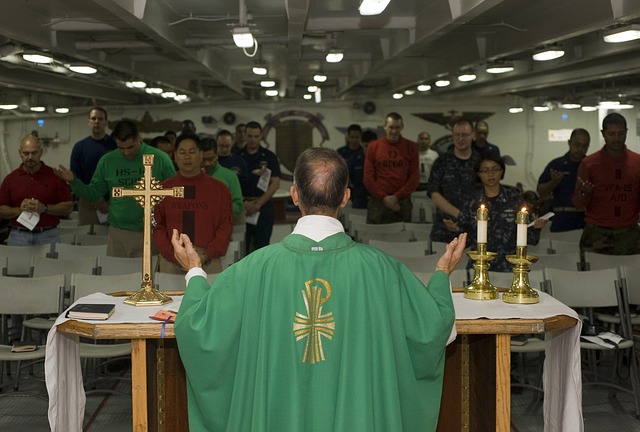
There are people who will tell you a major in religious studies isn’t a practical pursuit. They will say you won’t be able to find a job in such a field unless you want to be a member of the clergy or a teacher. We’ve done the research on it to debunk or verify if this is true. If a student is open to it, a major in religious studies can be highly rewarding on a number of levels, and employment is one of them.
What Is a Religious Studies Degree?
As you probably know, a degree is an academic title awarded to a person who completes a certain field of study at a college or university. Religious Studies is one field in which a student can earn a degree. The name of this field is self-explanatory, but some details of what makes up religious studies is in order.
An In-Depth Study
The most obvious target of study in this field is organized religions, specifically those which are often referred to as the World’s Great Religions. Regardless of a person’s religious training at home, the student is not subjected to the study of just one religion. This is not essentially a sacred study. It’s a secular one. Over the course of four years, the student will be exposed to many religions, large and small. Research is a big part of religious studies. World history is integrated with the social structure of the times when religions formed and evolved.
Delving into these areas, a student will be given courses that assist them in their efforts. Courses such as anthropology,
politics, and religious history form a foundation for their understanding of religious beliefs and traditions. Psychology is definitely a part of it, helping provide a perspective on the beliefs and behaviors of various groups.
Liberal Arts
Religious studies as a major will fall into the category of liberal arts, which is a broad area that includes philosophy, history, social sciences, education, mathematics, engineering and more. As part of the liberal arts, it inherently provides the student with a basic system for perceiving the world at hand. In this field, it means objectively taking in a comprehensive array of information about religions and all that comprises them. The liberal arts major is given the tools to be a versatile, adaptable person who can thrive in many types of environments. This is a beneficial combination indeed.
Is There a Need for People with Religious Studies Degrees?

Image by James Nichols from Pixabay
By teaching students how to think critically, how to research and communicate effectively, and how to see the world from many points of view, the liberal arts degree prepares students for numerous types of work. So, a field so specific as is religious studies isn’t necessarily excluded from demand in the workplace when the graduate has such a broad-based education.
Job Outlook for Grads
Statistics can give us a sense of security when they are reliable and point in the directions we hope. The United States Department of Labor’s Bureau of Labor Statistics gathers solid statistics that can help predict how occupations will fare in the coming years. In those two major occupations mentioned above, clergy and teaching, the Bureau relates some interesting information. They predict that jobs for clergy will increase by 8% between now and 2026. Positions for college professors of philosophy and religion are expected to rise faster than the average occupation in that same time period.
When occupations that relate directly and indirectly to religious studies degrees are compiled, they include clergy, philosophy and religion teachers, historians, marriage and family therapists, and social and human service assistants. As of 2018, the number of positions amounted to 517,920. All of those categories are projected to grow between now and 2026. The average rate of growth is expected to be 12.5%. This is a faster than average growth rate. To put some perspective on these statistics, we note that the fastest job growth in this field should be with marriage and family therapists (20.2%), and the slowest is expected to be with historians (5.4%). Still, all are expected to grow.
What Careers Can a Person with This Degree Pursue?

Image by David Mark from Pixabay
The career opportunities for those holding religious studies degrees range far and wide. Many, maybe most, have nothing to do with religion but more to do with the skill set the graduates have acquired during their college years. In fact, there’s a strong likelihood that even that skill set won’t be enough for the person to start the new job and career they will be starting. What they learned in school may be the foundation that makes them a desirable employee, but the application of those skills may only be of use in general. They will probably need training specific to the new job as they learn an entirely new skill set.
There are some jobs, though, that will emphasize what was learned in school. Here are some specific occupations to consider.
If the graduate doesn’t mind joining the military, there is a demand for chaplains. With a bachelor degree, they become eligible for the chaplain candidacy program. During this, chaplain training is provided while the person earns their seminary or divinity degree. If the person already holds the divinity degree, they can get a short training course on being a military chaplain, and they are ready to go on duty.
Religious counseling can be done by those with a religious studies degree. They can become certified through the Board of Professional and Pastoral Christian Counselors. Employment would come through churches or non-profit ministry associations.
Certain ministries within churches need qualified people to work them. This can include music directors, religious education directors, ministry outreach coordinators, pastoral assistants, and more. There’s plenty of rewarding work in these positions.
Missions sponsored by churches or other religious organizations do community and, often, evangelical work abroad, especially in third world countries. The pay doesn’t amount to much, but this work is more about helping people who desperately need it.
Moving Beyond Direct Religious Work
Working for non-profits can be a good place to utilize this type of degree as they need administrative help or people skills.
Writing-related positions are available here and there, some being for publishers of religious books, magazines, or website content. Religious studies graduates can provide proofreading, editing, and writing for such companies.
Research is a strong suit to use where the opportunity arises. With the amount of content being produced these days, there may be a demand for research in many places. Universities are potential employers along this line. Religious organizations that wish to research trends and information for their own literature could use researchers. Occasionally, museums need help with research as well. Having experience in historical research is a definite plus.
Teaching at the college level is not the only option. Positions in schools at all grade levels should be within reach in the subjects of history and social studies.
Law is another area where graduates would be welcome. Earning a degree to become an attorney or doing lesser studies to start a career as a paralegal could be something to build on the bachelor degree.
A career in social work aligns well with the knowledge and abilities gained studying religions, considering the significant amount of work done with people and organizations. This line of work is demanding, but helping others who are facing difficult challenges in their personal lives is akin to pastoral counseling and brings rewards above and beyond monetary compensation.
Other Potential Careers
The general skills of the graduate in the liberal arts fields have value across many fields of employment. It has been found that the companies requesting liberal arts majors and history majors are asking for them to fill such positions as intelligence analyst, business development manager, research analyst, management consultant, signals intelligence analyst, client service specialist, and patient services representative. The leading skills they want include writing, research, project management, management in general, communications, operations, and teaching. These are truly in line with the skills learned by our student of religious materials.
Conclusion

Image by PourquoiPas from Pixabay
We stated in the introduction to this article that a major in this field can be rewarding on a number of levels. Gaining a working and deep understanding of the history of humanity through the lens of religious traditions is truly important. To study each religion in detail provides a perspective that engenders tolerance and appreciation of all the world’s religions. If the student then decides to adopt a particular religion or leave another behind, despite a personal and familial history with it, that person stands a chance of doing so with the benefit of full knowledge as to why that move is being made.
Learning to research a subject fully results in a strong ability to confront and process data. Reporting on it develops organizational and writing skills that prepare the student for the work arena.
Presenting the thesis further enhances the ability to convey matters of importance in writing. Discussion of the subject matter in these studies helps the student work well and communicate well with others. These are all skills that result in a personal depth which will carry over into a successful career.
Featured Image Source: Pixabay


